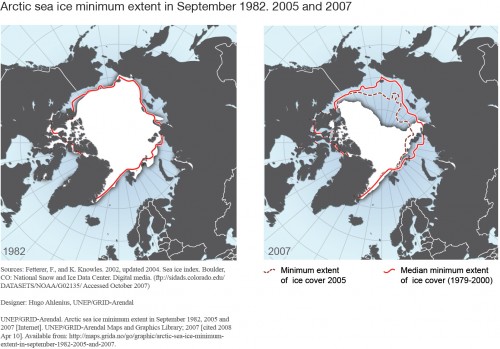In yet another series of crappy news coming from the poles of this planet global warming is having a greater and faster impact on the Arctic than previously thought, according to a new study by the global conservation organization WWF (pdf).
The new report, called Arctic Climate Impact Science – An Update Since ACIA, represents the most wide-ranging reviews of arctic climate impact science since the Arctic Climate Impact Assessment (ACIA) was published in 2005.
The new study found that change was occurring in all arctic systems, impacting on the atmosphere and oceans, sea ice and ice sheets, snow and permafrost, as well as species and populations, food webs, ecosystems and human societies. In essence fucking up everything.
Melting of arctic sea ice and the Greenland Ice Sheet was found to be severely accelerated, now even prompting the expert scientists to discuss whether both may be close to their “tipping point†(the point where, because of climate change, natural systems may experience sudden, rapid and possibly irreversible change).
“The magnitude of the physical and ecological changes in the Arctic creates an unprecedented challenge for governments, the corporate sector, community leaders and conservationists to create the conditions under which arctic natural systems have the best chance to adapt,†said Dr Martin Sommerkorn, one of the report’s authors and Senior Climate Change Adviser at WWF International’s Arctic Program. “The debate can no longer focus only on creating protected areas and allowing arctic ecosystems to find their balance. At the same time, we need to simultaneously reduce the vulnerability of social and environmental systems of the Arctic by reducing threats from human activity and building ecosystem resilience — the ability of ecosystems to remain stable when under a lot of pressure.â€
According to last year’s reports of the Intergovernmental Panel on Climate Change, if the entire Greenland Ice Sheet were to melt, sea levels would rise 7.3 metres, making its status a global concern. While it is currently impossible to accurately predict how much of the ice sheet will be melting, and over which time, the new report shows there has been a far greater loss of ice mass in the past few years, much more than had been predicted by scientific models.
Likewise, the loss of summer arctic sea ice has increased dramatically, with record lows reached in 2005 and — way more dramatic — in 2007. In September 2007, the sea ice shrank to 39 per cent below its 1979-2000 mean, the lowest since satellite monitoring began in 1979 and also the lowest for the entire 20th century based on monitoring from ships and aircraft.
“When you look in detail at the science behind the recent arctic changes it becomes painfully clear how our understanding of climate impacts lags behind the changes that we are already seeing in the Arctic,†said Sommerkorn. “This is extremely dangerous, as some of these arctic changes have the potential to substantially warm the Earth beyond what models currently forecast. That is because climate models don’t currently adequately incorporate important underlying drivers of the arctic changes we are already observing, such as the interaction between sea ice thickness and water temperature.â€
The Arctic is not only one of the places on Earth most vulnerable to climate change, but also a place where vulnerability is of urgent global relevance. WWF calls for a two-pronged strategy to minimize the impacts of climate change. “We need to reduce global emissions of greenhouse gases to levels that will avoid the continued warming of the Arctic and the anticipated resulting disruption of the global climate system,†said Sommerkorn.

What happened to the idea that coastal cites were going to flood of the north pole melted and what about Santa Claus?
*waves hand in front of face* there are no coastal cities. Seriously though “The Arctic ice cap is a shifting pack of sea ice some 6.5 to 10 feet (2 to 3 meters) thick” according to national geographic, on the other hand the south pole is between 300 and 2360 meters thick(wikipedia this time though). In other words, the north pole is the least of our worries when it comes to pole melting.
Enzer: Even a small bullet can kill a human being…the Arctic is a HUGE worry for you me and every other human on this planet. If it were to no longer freeze it would allow a lot of sun to heat up water that used to be very cool. This could set off the melting of the Greenland ice sheet, and the rapid thawing of the permafrost. Both events which would signal a runaway warming and sea level rise that would have disastrous results for the human race.
Sure its the least of our worries, but that doesn’t mean it isn’t a very large worry.
I understand what you mean completely, I just meant of the two poles…. somehow I always forget about Greenland, sadly, of course it’s not counting the permafrost areas in Canada, Russia, Alaska and other northern countries, though I must say, the Mayan’s calender ending on December 21, 2012 might not be so far fetched as an end of the world, or at least the end of the world as we know it, at that point. if we continue this way until that date, can the planet truly ever be reverted to how it once was?
No. Jim Hansen suggests that very shortly irreversible changes will take place, and the world will be changed until the next ice age (not due for a few tens of thousands of years).
K.